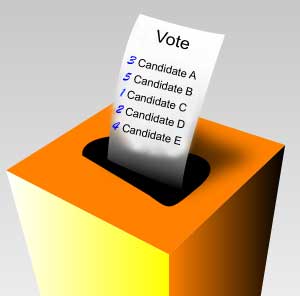 |
| (Photo credit: Wikipedia) |
One aspect of last week's elections for Police Commissioners that has received limited attention is the high number of spoiled ballot papers.
Figures released on the Bristol City Council website reveal that of 244,042 ballot papers counted, 9,190 were rejected by the returning officer. This means that 3.77 % of those who went into the polling booth last Thursday spoiled their voting papers for Police and Crime Commissioner in Avon and Somerset.
Alan Renwick from the University of Reading has calculated that nationally, spoiled ballots in the recent PCC elections made up 2.9% of votes cast. This compares with an average of 0.3% at recent general elections. Last week's poll clearly represented a massive increase in spoiled papers.
If we look more closely at the figures for Bristol itself (one of the nine local authorities that make up the Avon and Somerset Police Authority) a hefty 6.35% of all ballot papers were rejected/spoiled - 5,645 in total.
How can we explain the fact that Bristol voters spoiled their PCC ballots at more than double the national rate? Or that over 20 times more voters in Bristol chose to spoil their ballots than is typically the case for general elections nationally? If we look at spoiled ballots for the mayoral referendum in May this year, by contrast, only 264 papers were rejected out of 76,000 votes cast. And for the mayoral election itself last week, only 1.24% of papers were spoiled. It was the PCC ballots that were targeted in vast numbers by thousands of the electorate.
Alan Renwick suggests that the voting papers themselves may have been one factor nationally, with their supplementary vote system causing confusion to some. Though this was undoubtedly a factor, it surely cannot fully explain the massive incidence in ballot spoiling in Bristol. If this were the case, we would expect to see a much higher incidence of rejected papers for the mayoral election, with its eclectic mix of 15 colourful candidates, compared with only four nominees for the PCC role.
More probable is that large numbers of Bristol voters were unhappy with the whole idea of elected Police and Crime Commissioners. Renwick's analysis of the national scene is again relevant:
"The perception is that some voters expressed their disagreement with the idea of politicising the police by deliberately casting an invalid vote"
Anecdotally, Renwick also notes that
"Many observers at the 41 counts around England and Wales saw ballots with mini-essays on them."
Turnout locally was 27.9% for the mayoral vote and 19.59% for the PCC poll. The election of an Independent Mayor and an Independent Police Commissioner suggests that those who did vote last week used the opportunity to register their preference for a change of direction in Bristol's politics. This independent-mindedness also found expression in the massive number of spoiled ballots in the city itself.
And quite what the implications of this might be for future city council elections and the next national poll is, frankly, anyone's guess. A national party that promised to abolish the PCC role might pick up floating voters at the next general election.
At the very least, it's probably not a bad time to be an independent.
If you enjoyed this post, get free updates by email or RSS.

1 comment:
http://bloggershepherd.blogspot.co.uk/
Post a Comment